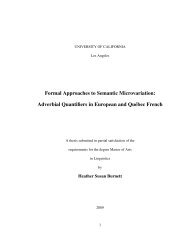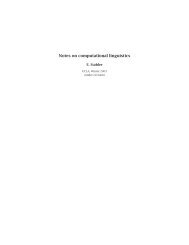Introductory Phonology - UCLA Department of Linguistics
Introductory Phonology - UCLA Department of Linguistics
Introductory Phonology - UCLA Department of Linguistics
Create successful ePaper yourself
Turn your PDF publications into a flip-book with our unique Google optimized e-Paper software.
<strong>Introductory</strong> <strong>Phonology</strong> Chapter 2: Phonemic Analysis p. 15<br />
[ˈpita] ‘century plant’<br />
[ˈpiɾa] ‘funeral pyre’<br />
As with the minimal pairs given for English above, this one demonstrates that for Spanish, the<br />
difference between [t] and [ɾ] signals a difference in meaning. That is to say, [t] and [ɾ] are in<br />
contrast, and are separate phonemes, /t/ vs. /ɾ/.<br />
Comparing English and Spanish, we see that the [t] vs. [ɾ] difference is allophonic (nondistinctive)<br />
for English, but phonemic (distinctive) for Spanish. Thus, in this area, the two<br />
languages are phonetically similar but phonologically different.<br />
Here is a similar case. Both English and Spanish have a [d] and a [ð] (the voiced dental<br />
fricative). In English, we know that the two sounds are separate phonemes, because minimal<br />
pairs exist:<br />
die [da] vs. thy [ða]<br />
bayed [bed] vs. bathe [beð]<br />
den [dɛn] vs. then [ðɛn]<br />
But in Spanish, there are no such pairs. Furthermore, by looking at Spanish data one can<br />
determine that [d] and [ð] are allophonic variants:<br />
[daðo] ‘given’<br />
[deðo] ‘finger’<br />
[usteð] ‘you (polite)’<br />
[donde] ‘where’<br />
[de ðonde] ‘from where’<br />
These and other data indicate that [ð] occurs only after a vowel, while [d] is the elsewhere<br />
allophone, occurring after consonants and initially. Thus [ð] and [d] are allophones <strong>of</strong> the same<br />
phoneme.<br />
We can set up the following phonological analysis for the sounds <strong>of</strong> Spanish discussed so<br />
far.

















